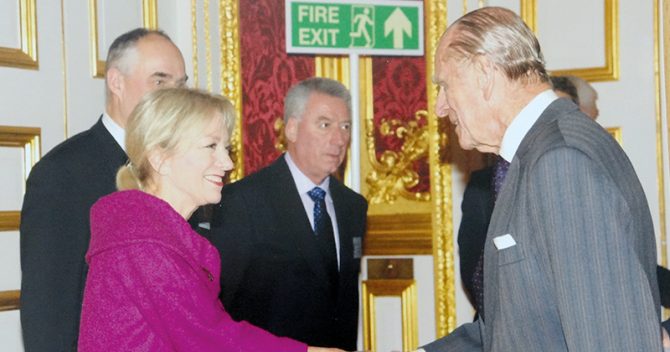FE Week revisits the outgoing Workers’ Educational Association chief executive Ruth Spellman and finds her focused, as ever, on improving adult education.
You could, very briefly, be disarmed into thinking Ruth Spellman is just an unusually sweet-mannered Londoner.
The 68-year-old is standing over me in her upstairs sitting-room in Highgate, with piano music tinkling in the background, offering an impeccably presented afternoon tea tray: Jaffa cakes, shortbread, chocolate biscuits, cups in saucers. Welsh daffodils, a nod to her homeland, are on a table to my right and pretty pictures of flowers, painted by her mother, adorn the walls.
And then she begins to talk, and it’s clear just how much the Workers’ Educational Association (WEA), the adult education charity she headed until January, has lost in losing her.
And yet Spellman, who is now in non-executive roles at the Open University and the Education & Training Foundation, keeps saying “we” about her former employer, as though she’s not quite let go yet.
In a rare move, FE Week has returned to interview Spellman after first profiling her in 2012 when she took the WEA chief executive role, her fourth CEO position and first for an educational body.

How were the seven years and nine months at the largest adult education organisation in the UK? And why has she left?
The night after our interview is her leaving do and Spellman is trying to get her speech right.
“I’m going to thank everyone, but I’m going to nail a couple of things too.”
Like what? “I will say, we have to have weekend learning. We have to have night school. If we’re going to expand, we have to invest in online learning. And we really need a big focus on communication and marketing so people know who we are.”
Spellman bursts with the sort of policy-focused energetic drive that not only makes rather a mockery of the retirement age, but also indicates she may be one of the best departmental leads Westminster never had.
Clearly, the job isn’t finished. When we first interviewed her, Spellman was saying she’d “like to see schools open at the weekend for adults”.
With no movement in that area, she today reiterates that bringing parents into schools to gain qualifications would “make more difference to education than any innovation I’ve seen in ten years”.
Similarly, she makes a powerful case for part-time learning, again and again.
“You’re not necessarily educated at 16 or 18 – you will need access to part-time education all your life.”
“Eighty per cent of the population are over age 21, and most of them won’t have had higher or further education. It follows that you need repeated opportunities to re-enter part-time learning.”
“Part-time learning is the answer.”

Spellman fluently delivers stats, some of which actually shock me. “In colleges, 89 per cent of people are under 19. The overwhelming proportion of the adult education budget is spent on young people. That’s not how it should be.”
One feels that Spellman senses these priorities have never been more urgent than now – even more so than when she was first appointed to the WEA and “the chairman was clear about the need for change”.
Mental illness and individuals struggling with debt are on the rise, she reminds me.
“Poverty has increased. Social mobility has gone backwards.”
Out of almost 48,000 learners on WEA courses in 2019, roughly 75 per cent were women, many of them older – so many younger, disadvantaged men aren’t accessing the courses. Meanwhile total spending on adult education, excluding apprenticeships, fell by nearly two-thirds since 2003.
But the biggest blow was in 2017, almost five years into Spellman’s tenure.
The former Skills Funding Agency announced seven regions would get devolved adult education budgets, with the requirement to tender beginning in earnest this year.
In one fell swoop, about one-third of the WEA’s guaranteed government funding, roughly £7 million out of a £19 million contract, was under threat.
With so much demanding the WEA’s attention, this was a huge upheaval.
Did Spellman decide to leave partly because of the funding change? (In fairness to her, the WEA’s previous CEO, Richard Bolsin, only stayed one year longer in the role.)
“No. It was tricky, and heartaching at times, but, no, I didn’t. The organisation needed new energy. But the funding change was a challenge we simply didn’t need to have.”
She emanates confidence in new chief executive Simon Parkinson, former boss of the Co-operative College, calling him a “subtle” leader, capable of navigating the WEA through external and internal politics.
But her deep frustration at the devolved budget situation she has left behind is clear.
“I’m all for localism, but we were local already. In my view, there is an overstatement of the value of bidding for work every five minutes. For a start, you’re risking breaking the bond we have with students. It’s quite hard to reach the people we reach. If you start saying to them, we’re not going to be running anything here next year, they can be put off. There’s too much casualness about breaking these relationships, and it’s really damaging.”
Spellman is also concerned that annual bidding could encourage organisations to target those learners who are the least expensive to help – “not the disadvantaged, or those with mental health issues.”
Yet Spellman has striven to leave the WEA in a strong position amid the turbulence. Out of 400 WEA employees, 300 were put on redundancy notice, but after voluntary redundancies, she managed to keep actual redundancies to about 50.
Even more impressively, under her leadership the WEA won the contract for six out of seven regions, only losing the Cambridgeshire and Peterborough Combined Authority.
I ask Spellman if she expected the budget challenge.
“No. I did not see the funding change coming. I always thought the loyalty to the WEA, in parliament particularly, would see us through.”
What does she wish she had achieved?
“I think raising the profile of the organisation more, which I have done, but not enough.”
It’s an important point. Before working for FE Week, this journalist had never heard of the WEA nor seen any online advertising, unlike, say, the Open University.
Before she left, Spellman oversaw the organisation’s Strategy 2025 paper, a plan she has passed to Parkinson to carry forward.
It makes considerable mention of ambassadors, and Spellman says “word of mouth” can get more people involved.
But in the age of free outreach on Twitter, Instagram and Facebook, it seems the WEA may be missing a trick if it wishes to attract younger, disadvantaged learners.
It’s quite hard to reach the people we reach
A quick search of the Strategy 2025 paper shows “social media” throws up zero results. Spellman listens intently to this criticism.
One of her last moves was to appoint a social media manager.
I ask Spellman what she’s most proud of.
“The WEA was very riven when I arrived between those who wanted to take it forwards and those who wanted to take it backwards. It didn’t have a clear strategy, and I brought that.”
Spellman introduced more flexibility for learners, such as short courses instead of year-long ones. English and maths skills were embedded across courses and tutors trained to provide clearer careers advice, so that learners came away more confident and focused, rather than simply with a qualification.
Internally, Spellman found “no one on my team had had a performance appraisal for 10 years” and she introduced training plans. “The professionalisation of the WEA has happened under me.”

As we speak, Spellman’s clear-sighted passion for the organisation she has led shines out.
Previous to the role, she led Investors in People, the Institution of Mechanical Engineers and the Chartered Management Institute.
In a way, the WEA is the culmination of a life-long career spent powerfully advocating for others’ careers.
There is a long pause where Spellman falters, and her voice catches. “It has a lot of loyalty, the WEA.”
For a moment this leader, whose own father and grandfather used the WEA, cannot speak.
One senses this has been an advocacy role for her like no other – and one which, though she has officially stepped back, will continue to drive her in all she does.









Your thoughts